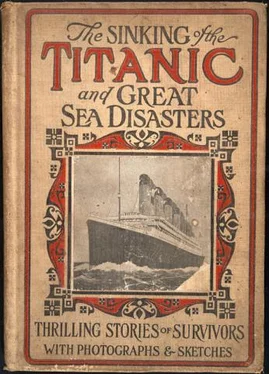Logan Marshall - Sinking of the Titanic and Great Sea Disasters
Здесь есть возможность читать онлайн «Logan Marshall - Sinking of the Titanic and Great Sea Disasters» весь текст электронной книги совершенно бесплатно (целиком полную версию без сокращений). В некоторых случаях можно слушать аудио, скачать через торрент в формате fb2 и присутствует краткое содержание. Год выпуска: 1912, Жанр: Прочая документальная литература, на английском языке. Описание произведения, (предисловие) а так же отзывы посетителей доступны на портале библиотеки ЛибКат.
- Название:Sinking of the Titanic and Great Sea Disasters
- Автор:
- Жанр:
- Год:1912
- ISBN:нет данных
- Рейтинг книги:4.5 / 5. Голосов: 2
-
Избранное:Добавить в избранное
- Отзывы:
-
Ваша оценка:
- 100
- 1
- 2
- 3
- 4
- 5
Sinking of the Titanic and Great Sea Disasters: краткое содержание, описание и аннотация
Предлагаем к чтению аннотацию, описание, краткое содержание или предисловие (зависит от того, что написал сам автор книги «Sinking of the Titanic and Great Sea Disasters»). Если вы не нашли необходимую информацию о книге — напишите в комментариях, мы постараемся отыскать её.
’s demise!
Sinking of the Titanic and Great Sea Disasters — читать онлайн бесплатно полную книгу (весь текст) целиком
Ниже представлен текст книги, разбитый по страницам. Система сохранения места последней прочитанной страницы, позволяет с удобством читать онлайн бесплатно книгу «Sinking of the Titanic and Great Sea Disasters», без необходимости каждый раз заново искать на чём Вы остановились. Поставьте закладку, и сможете в любой момент перейти на страницу, на которой закончили чтение.
Интервал:
Закладка:
Captain William S. Sims, of the United States Navy, who is in a position to know what he is talking about, has made some very pointed comments on the subject. He says:
“The truth of the matter is that in case any large passenger steamship sinks, by reason of collision or other fatal damage to her flotability, more than half of her passengers are doomed to death, even in fair weather, and in case there is a bit of a sea running none of the loaded boats can long remain afloat, even if they succeed in getting safely away from the side, and one more will be added to the long list of ‘the ships that never return.’
“Most people accept this condition as one of the inevitable perils of the sea, but I believe it can be shown that the terrible loss of life occasioned by such disasters as overtook the Bourgogne and the Titanic and many other ships can be avoided or at least greatly minimized. Moreover, it can be shown that the steamship owners are fully aware of the danger to their passengers; that the laws on the subject of life-saving appliances are wholly inadequate; that the steamship companies comply with the law, though they oppose any changes therein, and that they decline to adopt improved appliances; because there is no public demand for them, the demand being for high schedule speed and luxurious conditions of travel.
“In addition to installing efficient life-saving appliances, if the great steamship lines should come to an agreement to fix a maximum speed for their vessels of various classes and fix their dates and hours of steaming so that they would cross the ocean in pairs within supporting distances of each other, on routes clear of ice, all danger of ocean travel would practically be eliminated.
“The shortest course between New York and the English Channel lies across Nova Scotia and Newfoundland. Consequently the shortest water route is over seas where navigation is dangerous by reason of fog and ice. It is a notorious fact that the transatlantic steamships are not navigated with due regard to safety; that they steam at practically full speed in the densest fogs. But the companies cannot properly be blamed for this practice, because if the ‘blue liners’ slow down in a fog or take a safe route, clear of ice, the public will take passage on the ‘green liners,’ which take the shortest route, and keep up their schedule time; regardless of the risks indicated.”
The terrible sacrifice of the Titanic, however, is to have its fruit in safety for the future. The official announcement is made by the International Mercantile Marine that all its ships will be equipped with sufficient life-boats and rafts for every passenger and every member of the crew, without regard to the regulations in this country and England or Belgium. One of the German liners already had this complement of life-boats, though the German marine as a whole is sufficiently deficient at this point to induce the Reichstag to order an investigation.
{illust. caption = A diagrammatic map showing how…}
Prompt, immediate and gratifying reform marks this action of the International Mercantile Marine. It is doubtless true that this precaution ought to have been taken without waiting for a loss of life such as makes all previous marine disasters seem trivial. But the public itself has been inert. For thirty years, since Plimsoll’s day, every intelligent passenger knew that every British vessel was deficient in life-boats, but neither public opinion nor the public press took this matter up. There were no questions in Parliament and no measures introduced in Congress. Even the legislation by which the United States permitted English vessels reaching American ports to avoid the legal requirements of American statute law (which requires a seat in the life-boats for every passenger and every member of the crew) attracted no public attention, and occasional references to the subject by those better informed did nothing to awake action.
But this is past. Those who died bravely without complaint and with sacrificing regard for others did not lose their lives in vain. The safety of all travelers for all times to come under every civilized flag is to be greater through their sac-rifice. Under modern conditions life can be made as safe at sea as on the land. It is heartrending to stop and think that thirty-two more life-boats, costing only about $16,000, which could have been stowed away without being noticed on the broad decks of the Titanic, would have saved every man, woman and child on the steamer. There has never been so great a disaster in the history of civilization due to the neglect of so small an expenditure.
It would be idle to think that this was due simply to parsimony. It was really due to the false and vicious notion that life at sea must be made showy, sumptuous and magnificent. The absence of life-boats was not due to their cost, but to the demand for a great promenade deck, with ample space to look out on the sea with which a continuous row of life-boats would have interfered, and to the general tendency to lavish money on the luxuries of a voyage instead of first insuring its safety.
CHAPTER XXIX. THE SENATORIAL INVESTIGATION
PUBLIC sentiment with regard to the Titanic disaster was reflected in the prompt action of the United States Government.
On April 17th the Senate, without a dissenting vote, ordered an investigation of the wreck of the Titanic, with particular reference to the inadequacy of life-saving boats and apparatus. The resolution also directed inquiry into the use by the Titanic of the northern course “over a route commonly regarded as dangerous from icebergs.”
Besides investigating the disaster, the committee was directed to look into the feasibility of international agreements for the further protection of ocean traffic.
The Senate Committee on Commerce, in whose charge the investigation was placed, immediately appointed the following sub-committee to conduct the gathering of evidence and the examination of witnesses:
Senator William Alden Smith of Michigan, chairman; Senator Francis Newlands of Nevada, Senator Jonathan Bourne, Jr., of Oregon, Senator George C. Perkins of California, Senator Theodore E. Burton of Ohio, Senator Furnifold McL. Simmons of North Carolina and Senator Duncan U. Fletcher of Florida.
The Senate Committee began its investigation in New York on Friday, April 19th, the morning after the arrival of the Carpathia.
Ismay, the first witness, came to the witness chair with a smile upon his face. He was sworn and then told the committee that he made the voyage on the Titanic only as a voluntary passenger. Nobody designated him to come to see how the newly launched monster would behave on the initial trip. He said that no money was spared in the construction, and as she was built on commission there was no need for the builders to slight the work for their own benefit. The accident had happened on Sunday night, April 14th.
“I was in bed and asleep,” he said. “The ship was not going at full speed, as has been printed, because full speed would be from seventy-eight to eighty revolutions, and we were making only seventy-five. After the impact with the iceberg I dressed and went on deck. I asked the steward what the matter was and he told me. Then I went to Captain Smith and asked him if the ship was in danger and he told me he thought she was.”
Ismay said that he went on the bridge and remained there for some time and then lent a hand in getting the life-boats ready. He helped to get the women and children into the boats.
Ismay said that no other executive officer of the steamship company was on board, which practically made him the sole master of the vessel the minute it passed beyond the control of the captain and his fellow-officers. But Ismay, seeming to scent the drift of the questions, said that he never interfered in any way with the handling of the ship.
Читать дальшеИнтервал:
Закладка:
Похожие книги на «Sinking of the Titanic and Great Sea Disasters»
Представляем Вашему вниманию похожие книги на «Sinking of the Titanic and Great Sea Disasters» списком для выбора. Мы отобрали схожую по названию и смыслу литературу в надежде предоставить читателям больше вариантов отыскать новые, интересные, ещё непрочитанные произведения.
Обсуждение, отзывы о книге «Sinking of the Titanic and Great Sea Disasters» и просто собственные мнения читателей. Оставьте ваши комментарии, напишите, что Вы думаете о произведении, его смысле или главных героях. Укажите что конкретно понравилось, а что нет, и почему Вы так считаете.












